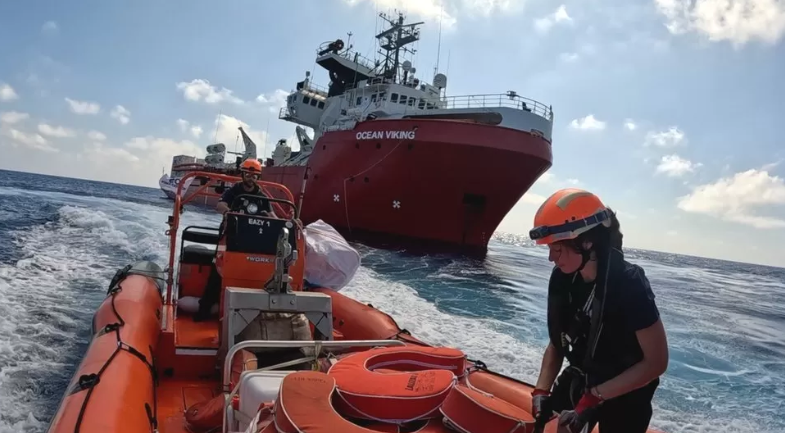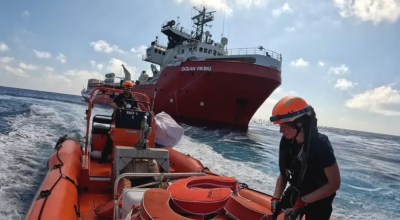BBC correspondent Alice Codi chose to accompany the crew of a red and white ship, known in maritime circles for its missions to rescue migrants lost in the labyrinth of the Mediterranean Sea, where tragedies of drowning, loss, and mass casualties repeat daily. Through difficult days, Alice recounts what she experienced with those who risk everything to cross to Europe, believing that there they will be reborn.
On board a rescue ship patrolling the sea for distressed migrant boats, Alice spoke with dozens who were rescued, in one of the first rescue operations in the Mediterranean since hundreds drowned when a boat sank off the Greek coast weeks earlier. They confirmed to her that nothing could prevent them from attempting to reach Europe.
Alice narrates that as the large rescue ship sailed, a scene emerged on the horizon: a dark blue inflatable boat, crowded with swaying heads. Rescue workers from the organization SOS Mediterranée donned helmets and life jackets as they raced to the scene in speedboats. They swiftly pulled migrants on board one by one and began counting. She states, "The boys and young men, most of whom are from The Gambia, had been at sea for 15 hours and traveled 54 nautical miles from the town of Castlevird in Libya, near Tripoli. We found them in a difficult state. Some later told me that shortly before the rescuers arrived, a fight almost broke out on the overcrowded boat. Some were determined to continue, while others pleaded to give up and try again later. One dropped his phone into the sea during the scuffle. One wore the familiar pale blue shirt of Manchester City football, while many of the migrants had iPhones. Few brought any water or food. Many cannot swim, armed only with inner tubes to use as flotation devices if they ended up in the sea."
Regarding their conditions after rescue, Alice comments: "Some migrants smile as they sit in the rescue boat—a selfie is taken by one of them. One later told me that when he held the hand of one of the rescuers, he thought, 'Now I've entered Europe.' The group was swiftly transferred to the rescue ship, where they underwent medical checks and received new clothes and bags containing essentials like toothbrushes."
It was not the first attempt. Alice confirms that the majority of the migrants were already aware of the risks they faced. Many say this was not their first attempt to reach Europe, with some having narrowly escaped death after being rescued from distressed boats and returned to Libya. A 17-year-old boy told her, "I tried seven times." She summarizes the situation on the rescue ship: "Every migrant I spoke to has friends who died trying the same journey. While they follow news on social media about the Greek disaster, one of the deadliest migrant shipwrecks in years, in which up to 750 people are believed to have died, which occurred less than two weeks ago, these migrants also sailed from Libya. One said it did not stop him because he believes that they would have the same mentality he possesses, commenting: 'Either you reach Europe or you die in the sea.' He emphasizes: 'There are only two options.'"
While aboard the ship, Alice received an alert about the inflatable boat through a text message, a hotline for migrants facing problems at sea, in coordination with the European border agency Frontex. She recounts: "More than 80 percent of the group are minors under 18. Many of the boys started their journeys years ago when they left home hoping to earn money to send to their families. Many say they have lost one or both parents, and as the eldest sons in their families, they feel responsible for supporting their loved ones. Most were from The Gambia, traveling over 2000 miles south and west of Libya."
The correspondent notes: "Given that The Gambia is one of the poorest countries in the world, according to the International Organization for Migration (IOM), Gambians have emigrated at the highest per capita rate of any country in Africa in recent years. Between 2015 and 2020, over 32,000 Gambians reached Europe through what is known as 'irregular migration.' A similar number arrived between 2020 and 2022. Frontex states that in the first five months of this year, the number of detected crossings more than doubled compared to the same period in 2022, reaching 50,318. It is the highest recorded number since 2017."
Alice describes how the young migrants felt relieved to be on the rescue boat, ensuring their journey to Europe, so they relaxed enough to begin telling her how they got there: "They took different paths to reach Libya, using networks of traffickers, crossing several countries from West Africa to the northern coast. According to 18-year-old Souma, his journey began when he contacted a 'broker' in nearby Mali, planning with him to start his trip to Europe, traveling through Algeria to Libya. Along the way, he stated that he was tied up, beaten, and deprived of food by the traffickers. He had no family members on board the boat."
About the moments of joy among those migrants, Alice says: "While they occupied themselves playing football and listening to loud music on the ship en route to the port, I found that their happiest moments were when their belongings, which they managed to salvage from the sea, were distributed. Those items, while being hung on the clothesline to dry, were the last link to their home, memories, and family."
She adds: "Life on board the ship starkly contrasts the way they describe living before embarking. In Libya, they say they lived in compounds run by traffickers while trying to gather money for crossing the Mediterranean. This stage of the journey cost them 3,500 Libyan dinars (£570)."
In one of the bitter stories, Alice relays a tale about a boy named "Adama," who was on a boat carrying 125 passengers that sank, of whom 94 survived: "I watched my friend die. I managed to save many, and I failed too. But it’s a shame after all this to return home because the family borrowed a lot for this journey with the aim of ensuring a provider living in Europe." The boy adds, "I was aware that we couldn’t reach safety without the rescue ship 'Ocean Viking,' so I tracked it through my phone."
According to figures from the UN Refugee Agency, over 64,000 people reached Italy after crossing the Mediterranean, with more than 1,000 of them from The Gambia. On board the rescue ship, the crew gives the group a lesson in basic Italian, as they sit on the deck carefully taking notes and repeating phrases. While some have friends who successfully crossed before them and shared details of their new lives, Europe is mostly seen as the land that takes them to football teams and their favorite players. One said, "I want to be a football player like Ronaldo." Many are excited to land in Italy, home of Serie A and its new champion, Napoli. However, their future remains uncertain.
As the ship docks in the port of Bari, the teenagers, who had been singing and dancing on the deck earlier, calm down, holding gray blankets and documents to present to the authorities. Some tremble as they wait to be called. They are welcomed at the port by health officials and border authorities, as well as the Red Cross and UN staff. Some are taken in ambulances for health treatment. Others are placed on buses and taken to reception facilities, where they will undergo further evaluations.
Alice concludes: "As he prepared to take his first step on European soil, that survivor boy turned around, waving on his way to a life that still remains cloudy."




